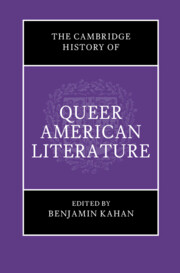Book contents
- The Cambridge History of Queer American Literature
- The Cambridge History of Queer American Literature
- Copyright page
- Contents
- Figures
- Tables
- Contributors
- Acknowledgments
- Introduction
- Part I Synchronic Histories of American Sexuality
- The Sexuality of American History
- Queer Literary Movements
- 9 Trans-ing Transcendentalism
- 10 Sentimental Literature and the Erotics of Identification
- 11 Queer Modernism and Misfit Identity
- 12 Imperialism and the Queer Harlem Renaissance
- 13 The Mystical Sexuality of the Beats and the Berkeley Renaissance
- 14 The New York School’s Queer Happiness
- 15 Chicana and Latina Lesbian Feminists and the Radical Making of Anthological Archives of Willfulness
- 16 Queer Literature after Queer Theory
- Part II Diachronic Histories of American Sexuality
- Part III Queer Methods
- Index
14 - The New York School’s Queer Happiness
from Queer Literary Movements
Published online by Cambridge University Press: 17 May 2024
- The Cambridge History of Queer American Literature
- The Cambridge History of Queer American Literature
- Copyright page
- Contents
- Figures
- Tables
- Contributors
- Acknowledgments
- Introduction
- Part I Synchronic Histories of American Sexuality
- The Sexuality of American History
- Queer Literary Movements
- 9 Trans-ing Transcendentalism
- 10 Sentimental Literature and the Erotics of Identification
- 11 Queer Modernism and Misfit Identity
- 12 Imperialism and the Queer Harlem Renaissance
- 13 The Mystical Sexuality of the Beats and the Berkeley Renaissance
- 14 The New York School’s Queer Happiness
- 15 Chicana and Latina Lesbian Feminists and the Radical Making of Anthological Archives of Willfulness
- 16 Queer Literature after Queer Theory
- Part II Diachronic Histories of American Sexuality
- Part III Queer Methods
- Index
Summary
This chapter argues that the New York School of Poets occupy a complex transitional moment in relation to both the history of sexuality and the history of poetry and modern art. Their work is governed by both the epistemology of the closet that shapes high modernism from earlier in the twentieth century and, looking forward to Stonewall and Gay Liberation, also presents utopian potentialities in its experimental forms of sociability.
- Type
- Chapter
- Information
- The Cambridge History of Queer American Literature , pp. 255 - 268Publisher: Cambridge University PressPrint publication year: 2024

